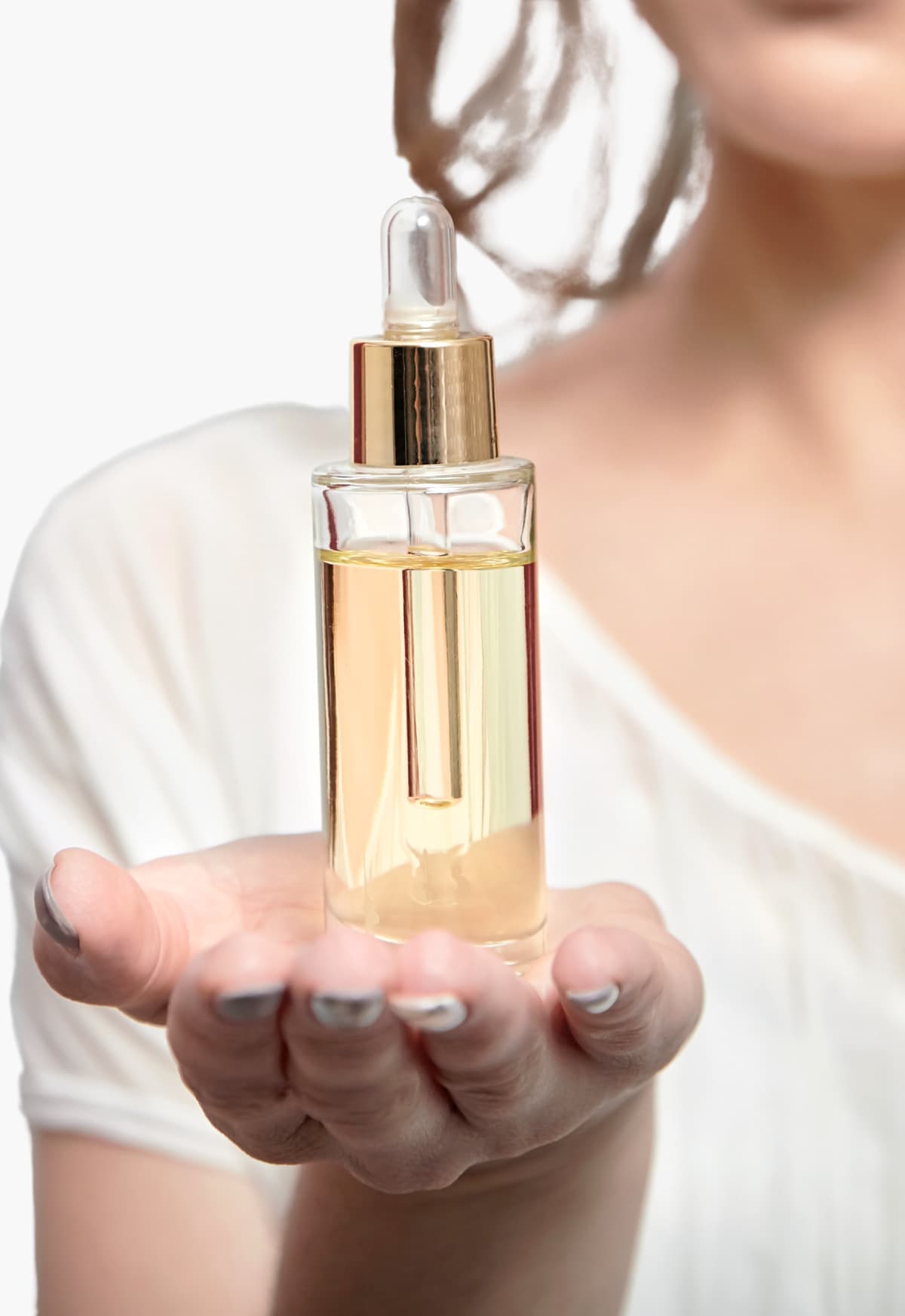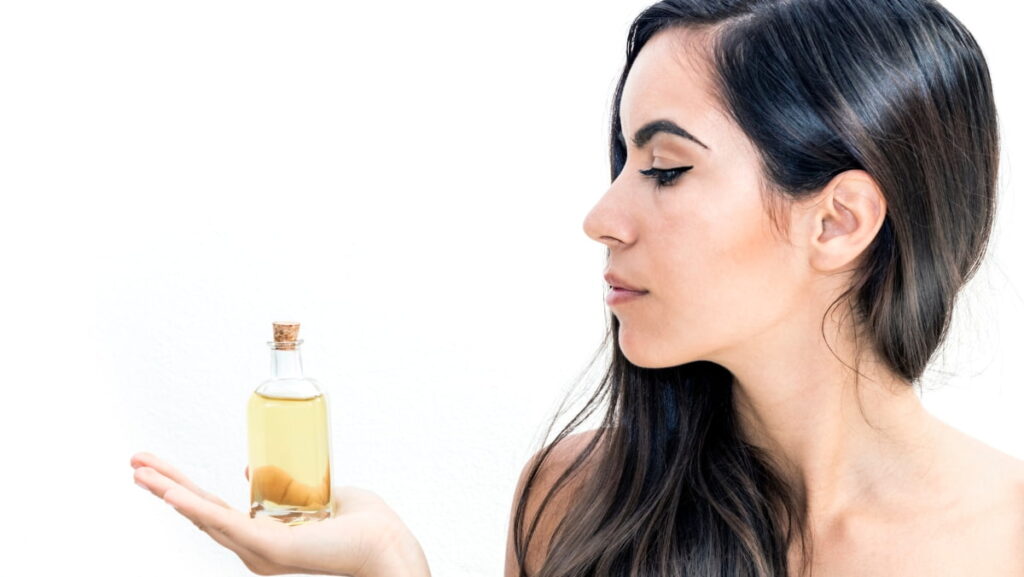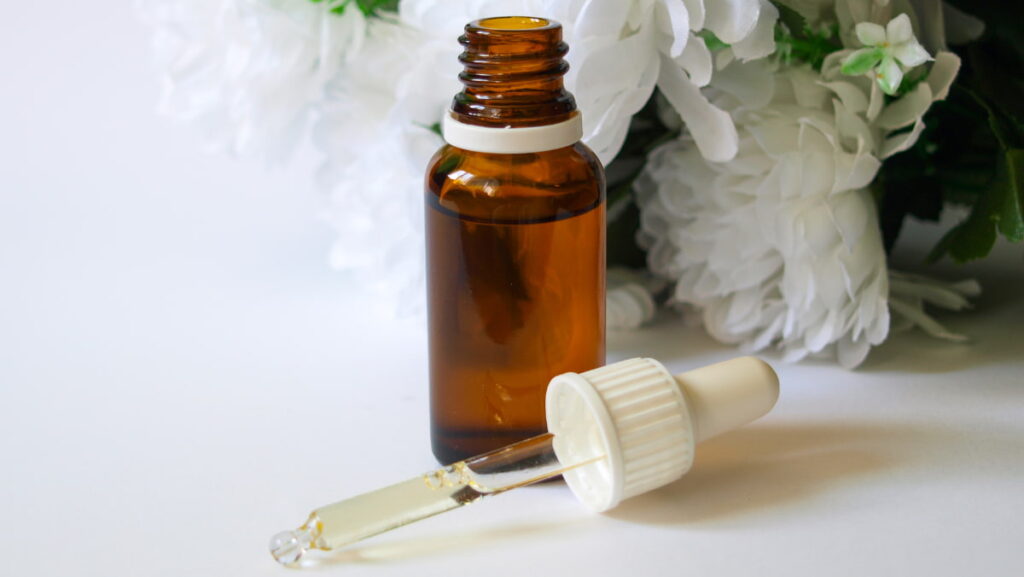
Imagine struggling with dry skin, acne, and premature aging all at the same time. Sounds discouraging, right? Don’t fret because Argan oil might be the all-in-one solution for you.
Extracted from the kernels of the Moroccan Argan tree, this precious liquid gold has been celebrated for centuries, not just for its culinary uses but also for its impressive range of skincare applications.
In this article, I’ll spill the tea on the all-around benefits of Argan oil for the skin and discuss how incorporating it into your skincare routine can do wonders for the overall health of your complexion.
Our skin is a complex organ with multifaceted needs. Therefore, finding that elusive magical ingredient that caters to all our skin concerns might feel like an impossible quest. That’s where Argan oil comes in.
Rich in essential fatty acids, antioxidants, and vitamins, it’s a potent ingredient with the power to transform your skin.
Regardless of your skin type, whether dry, oily, or combination, this versatile oil can deliver impressive results.
Now, let’s get into the nitty-gritty of the benefits Argan oil has to offer. From intense hydration and protection against environmental damage to reducing inflammation and promoting cell regeneration, Argan oil is one ingredient you’ll want to add to your skincare arsenal.
Whether you’re new to the world of natural skincare or a seasoned pro, I’m confident that by the end of this article, you’ll be eager to give this fantastic oil a try. Let’s unpack the incredible benefits of Argan oil for the skin!
What Is Argan Oil
Argan oil is a versatile and highly sought-after natural oil derived from the kernels of the Argan tree (Argania spinosa), primarily found in Morocco.
Before we dive into the benefits of Argan oil for the skin, let’s refresh your knowledge of the different types of Argan oil out there.
Argan oil exists in three main types: edible, beauty, and cosmetic Argan oil. Edible Argan oil, derived through cold pressing from roasted Argan kernels, finds its place on bread or in cooking to enhance the flavors of ethnic dishes.
On the other hand, beauty Argan oil, obtained through cold-pressing non-roasted Argan kernels, is intended for direct application to skin and hair.
In contrast, cosmetic Argan oil is extracted with a lipophilic solvent from ground Argan kernels. Unlike its counterparts, it exclusively serves as an ingredient in cosmetic formulations and cannot be consumed or applied directly to the skin.

What Makes Argan Oil So Great
Argan oil has been used for centuries in traditional beauty regimens in its birthplace, Morocco. This precious oil, often referred to as liquid gold due to its rich composition and countless benefits, boasts numerous nourishing properties for the skin.
Let’s dive into some of the key nourishing properties that hide behind the benefits of Argan oil for the skin, making it a must-have for a healthy and radiant complexion.
Essential Fatty Acids
Argan oil is packed with essential fatty acids such as oleic and linoleic acids. These significant components act as emollients that play a crucial role in maintaining skin elasticity, regeneration, and overall health. Moreover, they aid in retaining the skin’s natural moisture, preventing dryness and cracking.
With a high oleic content, Argan oil can regulate sebum production, and its rich linoleic content grants it effective anti-inflammatory properties.
Vitamin E
Argan oil is an excellent source of Vitamin E (tocopherols), a powerful antioxidant that safeguards our skin against damage from free radicals and environmental stressors. By neutralizing these harmful molecules, Vitamin E helps keep our skin youthful and radiant while promoting cell regeneration and reducing inflammation.
Squalene
Argan oil contains a significant amount of squalene, a naturally occurring compound often found in our skin’s sebum.
Squalene helps to moisturize and protect the skin, ensuring a soft, smooth, and healthy complexion. Additionally, its antioxidant properties assist in skin-cell regeneration, preventing premature aging.
Phenols and Sterols
These active compounds are found in Argan oil and provide numerous skin benefits, such as:
- Antioxidant properties: They neutralize free radicals, protecting our skin from oxidative stress and premature aging.
- Anti-inflammatory effects: They help to soothe and calm irritated or inflamed skin, making Argan oil an excellent treatment for various skin conditions.
- Protection and repair: They strengthen the skin’s barrier, allowing it to better retain moisture and defend against environmental damage.
7 Amazing Benefits Of Argan Oil For The Skin
Now that we have established the unmatched potential of Argan oil, it’s time to see why it is so popular in the skincare cycles. Without further due, let’s discover seven incredible benefits of Argan oil for the skin:
1. Argan Oil Packs A Moisturizing Punch
Argan oil boasts exceptional moisturizing benefits for the skin. Its lightweight and non-greasy texture makes it an ideal moisturizer, as it deeply penetrates the skin without clogging pores.
Argan oil effectively locks in hydration, creating a protective barrier that helps to retain moisture, soften rough patches, and promote a smoother complexion.
Whether used on the face, body, or hair, Argan oil’s nourishing properties make it a versatile and sought-after choice for those seeking a natural and potent moisturizing solution.
2. Argan Oil Restores The Lipid Barrier
Argan oil is a remarkable remedy for restoring the skin’s lipid barrier. Laden with essential fatty acids like oleic and linoleic acid, this oil effectively replenishes the natural lipids that make up the skin’s protective barrier.
When the lipid barrier is compromised due to harsh weather, excessive cleansing, or environmental stressors, the skin becomes prone to dryness, irritation, and sensitivity.
Argan oil’s composition closely resembles the skin’s own lipids, enabling it to seamlessly integrate and reinforce the lipid barrier.
Regular application of Argan oil not only helps to repair and strengthen the barrier but also aids in retaining moisture, reducing water loss, and fostering a healthier, more resilient complexion.
3. Argan Oil Has Anti-Aging Effects
Argan oil has become increasingly popular in skincare due to its numerous benefits, especially its anti-aging effects. I’ve discovered that this natural oil can help to keep my skin looking youthful and vibrant.
First, Argan oil is a potent source of antioxidants like vitamin E and phytosterols. These compounds are crucial in the fight against free radicals that can lead to premature skin aging.
It helps to protect my skin against environmental stressors, like pollution and UV radiation, maintaining its youthful appearance.
Argan oil also contains essential fatty acids, such as oleic and linoleic acids, which help to maintain my skin’s natural moisture barrier.
By keeping my skin well-hydrated, I’ve noticed a marked improvement in the appearance of fine lines and wrinkles.
One remarkable study has shown that the daily application of Argan oil for 60 days on postmenopausal women can restore the impaired barrier function of the skin, as it significantly reduces transepidermal water loss, restoring skin elasticity.
4. Argan Oil In The Fight Against Acne
Let’s face it, acne and blemishes can take a toll on our confidence. But fear not because Argan oil offers a powerful yet gentle solution to these skincare woes.
Argan oil is packed with anti-inflammatory, antibacterial, and non-comedogenic properties that could work wonders for acne-prone skin.
First and foremost, Argan oil is rich in linoleic acid that helps reduce inflammation and redness caused by acne.
Potentially due to oleic acid, Argan oil also showcases sebum-regulating properties. Argan oil has an ideal balance of these two fatty acids, promoting an acne-free complexion.
Antioxidant properties present in Argan oil, particularly vitamin E, can also protect and heal our skin. Vitamin E helps to neutralize harmful free radicals that can cause inflammation and skin damage, reducing the risk of acne scarring and blemishes.
This valuable vitamin also assists in the skin’s natural healing process, encouraging the regeneration of new skin cells.
The battle against acne wouldn’t be complete without addressing bacteria. Argan oil is thought to have antibacterial properties that help keep acne-causing bacteria at bay.
By preventing bacterial growth, Argan oil may reduce the likelihood of breakouts and help you achieve clearer skin.
Here are some additional benefits of Argan oil for acne-prone skin:
- It’s a lightweight oil easily absorbed by skin, making it suitable for oily or combination skin types.
- Its non-comedogenic nature prevents clogged pores and breakouts.
- It helps balance the skin’s natural oil production, reducing oiliness.
- It can help soothe irritation and redness caused by acne and other skin conditions.
5. Argan Oil Reduces The Appearance Of Scars And Stretchmarks
One of the most impressive benefits of Argan oil for the skin is its ability to promote wound and scar healing, making it an invaluable asset in comprehensive skin care.
Enriched with a potent blend of antioxidants and essential fatty acids, it can accelerate the healing of wounds, scars, and even acne scars.
Moreover, its nurturing properties can enhance the recovery of burns, offering soothing relief and aiding in skin regeneration.
Not stopping there, Argan oil’s remarkable attributes even extend to diminishing the appearance of stretch marks, fostering skin that exudes vitality and resilience.
6. Argan Oil May Brighten The Skin
For ages, Moroccans have cherished Argan oil as a beauty secret for keeping complexions light and vibrant. What’s the magic?
Well, it turns out that Argan oil can slow down melanin production, thanks to its tag team of tocopherols and other components.
This unique combo makes Argan oil a potential superhero against hyperpigmentation issues, promising a more even and radiant skin tone.
7. Argan Oil May Help In Various Skin Conditions
One of the major benefits of using Argan oil is that it’s incredibly gentle on the skin. It’s light, non-greasy, and absorbs quickly, making it ideal for sensitive or easily irritated skin.
Argan oil’s naturally occurring fatty acids promote skin health and can help alleviate the symptoms of eczema and psoriasis.
These fatty acids strengthen the skin’s barrier and provide hydration, effectively reducing dryness and inflammation.
Bonus: Argan Oil Nourishes The Hair And Scalp
Argan oil isn’t just a skincare star—it’s a hair and scalp hero too. Packed with essential fatty acids, vitamins, and antioxidants, it’s like a nourishing elixir for your locks.
Whether you’re battling frizz, seeking shine, or taming a dry scalp, Argan oil’s got your back. It effortlessly penetrates strands, boosting circulation and promoting hair growth while restoring that natural softness and vibrancy.
How To Use Argan Oil On Your Skin
Learning the mind-blowing benefits of Argan oil for the skin has got you wondering how you can use it on the face.
First of all, make sure you’re using 100% pure, cold-pressed Argan oil to ensure maximum benefits for your skin. Cheaper, diluted oils may not deliver the same results, so it’s always wise to invest in quality products.
Here’s a comprehensive guide on how to can use Argan oil on your skin:
- Cleanse your face: Start with a clean face by washing it gently with a mild cleanser and patting it dry.
- Apply a few drops: Take a few drops of Argan oil onto your fingertips. You’ll only need a small amount, as a little goes a long way.
- Warm the oil: Rub the oil between your palms to warm it up. This makes it easier to apply and allows better absorption into the skin.
- Massage onto your face: Gently massage the oil onto your face using upward circular motions. Focus on areas that require extra moisture or attention, such as dry patches or fine lines.
- Eye area: You can also apply a small amount of Argan oil around your eye area, but be careful not to get it into your eyes.
- Neck and décolletage: Extend the application to your neck and décolletage, as these areas can also benefit from the hydrating properties of Argan oil.
- Allow absorption: Leave the oil on your skin for a few minutes to allow it to absorb fully.
- Optional: If you have very dry skin or want additional hydration, you can follow up with your regular moisturizer after the Argan oil has been absorbed.
- Adjust usage: Depending on your skin’s needs, you can use Argan oil once or twice daily. Some prefer using it as part of their nighttime skincare routine due to its slightly heavier texture.
Additional Tips:
- Patch test: If you’re using Argan oil for the first time, it’s a good idea to do a patch test on a small area of your skin to ensure you don’t have any adverse reactions.
- Hair and body: Argan oil can also be used on your hair to moisturize and add shine, as well as on your body to nourish dry areas like elbows and knees.
- Sun protection: Remember that while Argan oil provides hydration and nourishment, it does not contain sunscreen. It’s essential to use broad-spectrum sunscreen to protect your skin from the sun’s harmful rays.
- Apply sparingly: A few drops of Argan oil go a long way. Use your fingertips to gently massage the oil into the affected area, and give it some time to absorb completely.
- Be consistent: To see the best results, use Argan oil consistently. I recommend applying it once or twice a day, depending on the severity of your skin irritation.
By following these steps, you can incorporate liquid gold into your skincare routine and enjoy the moisturizing and nourishing benefits of Argan oil for the skin.

Potential Side Effects On The Skin When Using Argan Oil
Argan oil is generally safe for most people to use on their skin. However, like any skincare product, there is a possibility of experiencing side effects or allergic reactions.
Here are some potential side effects to be aware of when using Argan oil:
- Allergic reactions: Some individuals may be allergic to Argan oil or its components. Allergic reactions can manifest as redness, itching, rash, hives, or swelling. If you experience any of these symptoms, discontinue use and consult a healthcare professional.
- Acne breakouts: While Argan oil is non-comedogenic (meaning it doesn’t clog pores), some people may find that it doesn’t suit their skin and can cause breakouts or worsen existing acne. If you have acne-prone skin, it’s a good idea to test a small area first and monitor for any adverse reactions.
- Sensitivity to sunlight: Although not common, some individuals may experience increased sensitivity to sunlight when using Argan oil. This sensitivity can make the skin more prone to sunburn. If you notice this effect, consider using Argan oil at night or ensure you apply broad-spectrum sunscreen during the day.
- Skin irritation: In rare cases, Argan oil can cause skin irritation, especially if you have sensitive skin or if the oil is of lower quality or contains additives. If you experience persistent redness, burning, or stinging, discontinue use and seek medical advice.
To minimize the risk of side effects, choose a high-quality, pure, and organic Argan oil. Perform a patch test on a small area of your skin before applying it more extensively.
If you have any known allergies or sensitive skin, it’s advisable to consult a dermatologist before trying Argan oil.
The Best Skincare Products With Argan Oil
If you don’t like experimenting with oils, you can opt for an Argan oil-infused product. These will allow you to harness all the skin-loving benefits of Argan oil for the skin without much hassle.
Here are some of my favorite picks:
- Josie Maran 100% Pure Argan Oil: This iconic Argan oil is a multi-purpose moisturizer that nourishes and hydrates the skin.
- The Ordinary 100% Organic Cold-Pressed Moroccan Argan Oil: This pure and cold-pressed Argan oil is rich in antioxidants and helps to moisturize and nourish the skin.
- Facetheory Calming Argan Oil O1: A versatile hydrating oil that combines organic Moroccan argan oil with vitamin E (1%) to deliver soothing moisture to dry or inflamed skin.
- Josie Maran Whipped Argan Oil Face Butter: This lightweight face butter is infused with Argan oil to hydrate and revitalize the skin.
Alternatives To Using Argan Oil On The Skin
Argan oil is a great natural product for the skin, but there are alternatives as well:
- Coconut oil, for instance, is an excellent moisturizer and can be used on the face and body.
- Jojoba oil is also beneficial in maintaining moisture balance in the skin.
- Aloe vera gel has soothing properties and makes a great base for homemade masks or just applied to soothe irritated skin.
- Finally, olive oil is an effective cleanser that helps keep your pores free from debris.
Benefits Of Argan Oil For The Skin: Versatility for Skin Health
Argan oil has proven to be a powerful addition to anyone’s skincare routine. With its numerous benefits and the sheer variety of ways it can be applied, it’s no wonder this oil has gained significant popularity.
The benefits of Argan oil for the skin can be summarized as: moisturizing, anti-aging, acne-fighting, wound-healing, skin-brightening, and hair nourishing. Wow, what an impressive resume!
I’m confident that incorporating Argan oil into a skincare routine will lead to visible improvements. Don’t hesitate to try this versatile, all-natural oil and enjoy the many benefits it can bring to your skin’s health.
